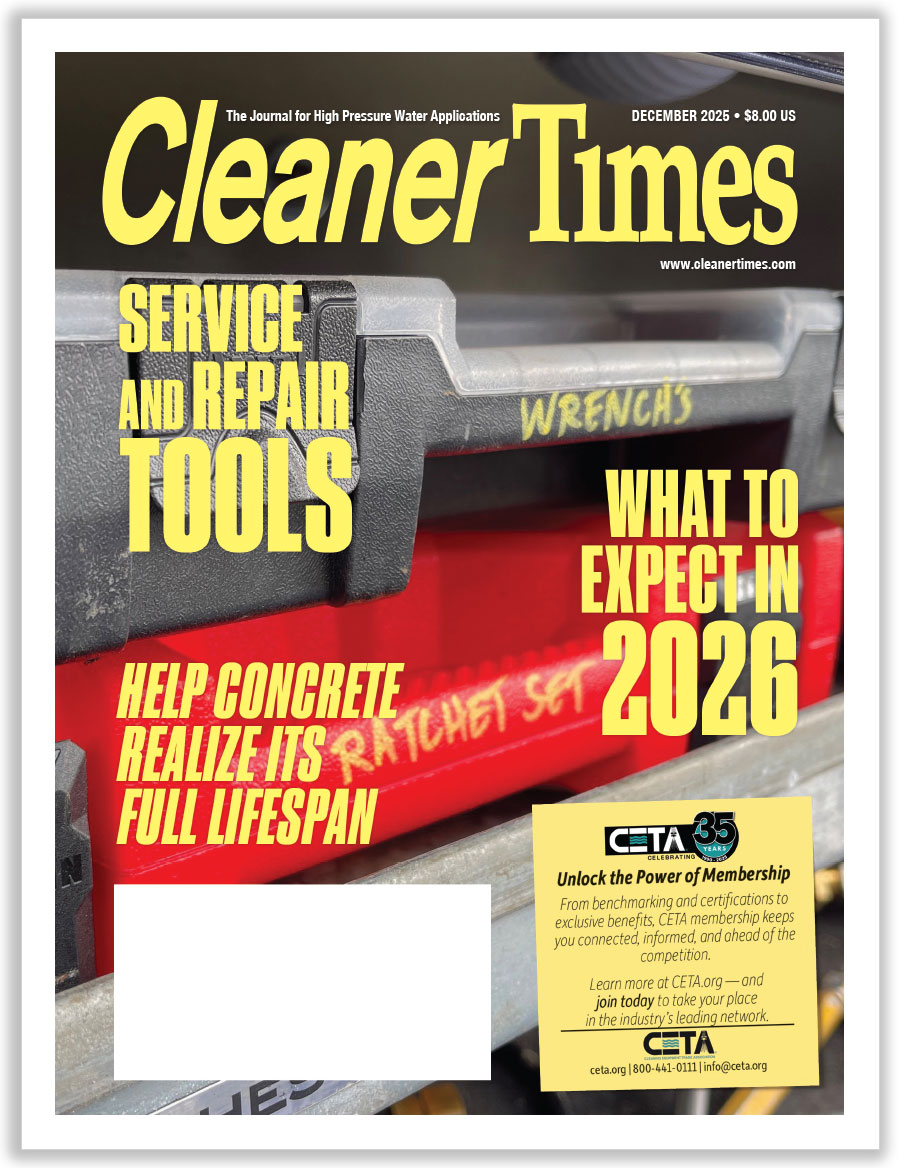
Financial
Coping with 2022’s Uncertainty and Taxes
By Mark E. Battersby / Published April 2022

With the pressure cleaning operation’s 2021 taxes finished, filed, or postponed until later, it might be time to think about the new ballgame that is the 2022 tax situation. Oh, sure, the controversial Build Back Better Act may or may not emerge, in whole or in part, to foil any planned tax savings. But, far more certain, are the many changes and new taxes to be faced in 2022.
There are various changes affecting employment taxes, especially the status of those operating as or doing business with independent contractors and coping with worker shortages, as well as new reporting requirements for payments from third-party providers and digital assets such as cryptocurrencies all taking place in 2022.
Danger Ahead With Payrolls
Many of the potential tax savings—and currently misunderstood or neglected law provisions—were already on the books. The Coronavirus Aid, Relief, and Economic Security (CARES) Act allowed employers to defer deposits and payments of their share of Social Security taxes from March 27 through December 31, 2020. While 50 percent of those deferred amounts were required to be deposited by December 31, 2021, any remaining amount must be deposited by January 3, 2023.
The deferment of payroll taxes isn’t the only potential problem—and opportunity—many pressure washing contractors, distributors, and manufacturers will face in the months ahead. Consider the controversy over who is and isn’t an independent contractor that continues to rage in 2022. Under our federal tax law, independent contractors are self-employed individuals who are responsible for their own tax filings and payments. Independent contractors pay both income and self-employment taxes on their earnings.
To make it easier for the IRS to track those using or claiming independent contractor status, instead of reporting compensation for independent contractors on Form 1099-MISC (Miscellaneous Income), a new form, Form 1099-NEC (Nonemployee Compensation), was introduced for the 2021 tax year. The new form will, presumably, allow the IRS to better track independent contractors.
Now is the time to ensure that the independent contractors used by the pressure cleaning business and those calling themselves independent contractors really are. Fortunately, the IRS has a form, Form SS-8, that either workers or an employer can fill out to obtain an IRS determination on worker status.
Ongoing Worker Attraction Dilemma
Properly labeling workers can occur only after they are on the payroll. Attracting workers to the pressure washing operation poses its own problems. Consider the following:
- Sign-on bonuses to attract needed workers: A so-called “signing bonus,” just like those we’re familiar with in professional sports, is money a pressure cleaning business gives someone who has accepted their job offer. For payroll tax purposes, when the business pays a signing bonus—or any bonus—it is “supplemental” income and requires a higher withholding rate. Bonuses are not considered deductible expenses for sole proprietorships, partnerships, or limited liability companies (LLCs) because the owners/partners/members are considered to be self-employed.
- Work-Opportunity Tax Credit: The Work Opportunity Tax Credit (WOTC) is a tax credit (not a deduction, but rather a direct reduction of the operation’s tax bill) available to employers hiring individuals from targeted groups who have faced significant barriers in employment. The credit amount for the WOTC can be up to $9,600 for each qualified new hire, depending on the targeted group the new hire is drawn from. The WOTC has been extended through 2025.
The Way We Do Business
Many pressure cleaning contractors and other business owners recently discovered—or will discover, should they face an IRS audit—that even seemingly common business deductions have a dark side. Among the moves that should be considered in the months ahead are such things as the following:
- Remove from the Books: It’s not unusual for a business to keep assets that have been abandoned, lost, or scrapped on the books. If they have been fully depreciated, there is no tax or financial impact. However, if the asset wasn’t fully depreciated, a tax deduction for the remaining value, an abandonment loss, may be an option if disposed of.
- Related-party Transactions: All too often unsuspecting pressure cleaning business owners find themselves facing penalties, fines, and substantial tax bills because the ever-vigilant IRS has labeled a past transaction as having been conducted by “related persons.” Loans at below market rates, sales of property, installment sales, like-kind exchanges, intercompany transactions, etc. involving not only family members but owners or shareholders related to the business, or friends, officers, suppliers, etc. may be defined as transactions between “related” parties.
The New Tattle-Tale Society
Whether innocently or otherwise, many pressure washing business owners and operators overlook some of their operation’s reportable income. Today, as a reminder or check, the IRS has new reporting requirements.
- Digital Asset Reporting: It is not only so-called “brokers” impacted by 2021’s Infrastructure Investment and Jobs Act (IIJA). The 2021 IIJA included reporting requirements for virtual currency and other digital assets impacting every business that receives more than $10,000 in digital assets on or after January 1, 2023.
- Third-party Payment Providers: Any independent contractor or business receiving payment through PayPal, Venmo, Zelle, CashApp, or any third-party settlement provider (TPSP) will soon discover that it is being reported to the IRS. Thanks to the American Rescue Plan of 2021, millions of small businesses receiving more than $600 during the 2022 tax year—regardless of how many customers or clients are paying—will discover their payment service has reported those amounts to the IRS.
- Documenting It All: Records, such as receipts, canceled checks, and other documents that support an item of income, a deduction, or a credit appearing on the return must be kept as long as they may become material to the administration of our voluminous tax laws.
Manually kept records satisfy the tax law if they are accurate and can be understood or explained if questioned, but what happens if the original paper records are exposed, scattered, or lost in a hurricane, tornado, or similar catastrophe?
If records are stored someplace that is vulnerable, at least put some roadblocks, such as a safe, in place to deter crooks or combat natural disasters. However, most businesses are going paperless and storing everything electronically, with many contractors and other businesses routinely making PDFs of important papers and records or storing backups in a safe place.
According to the IRS, electronic records are just as official as the paper originals. Utilizing a software program, math errors are eliminated and profit and loss statements, along with the operation’s other financial statements, can be produced with the click of a button.
Not All Income Is Equal
Much has been written and said about the special treatment of income from so-called “pass-through entities” such as partnerships, S corporations, etc. While we anticipate future changes in the tax rates for individuals, incorporated pressure cleaning businesses, and those pass-through entities, there is no doubt discrepancies will continue in the months ahead. This makes understanding how the operation’s business entity is labeled important. Consider the following:
- Qualified Business Income: The Qualified Business Income (QBI) deduction allows the owner of a pass-through business who makes less than $64,900 during the 2022 tax year to claim up to a 20 percent deduction from their taxable business income. In general, total taxable income this year must be under $170,000 for single filers and $340,000 for joint filers. Over that limit, complicated rules determine whether the business income qualifies for a full or partial deduction.
- Another Way of Doing Business: Every owner of a small business that has outgrown their current business structure has several options for structuring the business. They can operate as a sole proprietor, partnership, limited liability company (LLC), or S corporation and, hopefully, benefit from the 20 percent deduction for Qualified Business Income (QBI). Or they can incorporate as a regular “C” corporation.
The structure of the pressure cleaning business will obviously impact how taxes will be filed. Changing the business structure used to be rare as the top corporate tax rate was 35 percent. However, the Tax Cuts and Jobs Act (TCJA) of 2017 dropped the top corporate rate to only 21 percent. While Congress has proposed an increase in the corporate tax rate to 26.5 percent, the tax bills of many businesses—and their owners—might benefit from an entity change, especially those with pass-through businesses.
Changing business entities may help reduce risk exposure, help the operation attract investors, or lower the pressure washing operation’s tax bill. Naturally, the IRS will require adjustments in income and deductions to ensure they won’t lose revenue as a result of the switch. In general, entity switches must occur within the first few months of a tax year although there are numerous exceptions.
Our tax laws may change, and the IRS may impose new rules and/or limit write-offs. However, one thing that will never change is the importance of tax planning. Substantial tax savings are possible with planning, especially planning not at year’s end but during the year as the pressure cleaning business operates.





